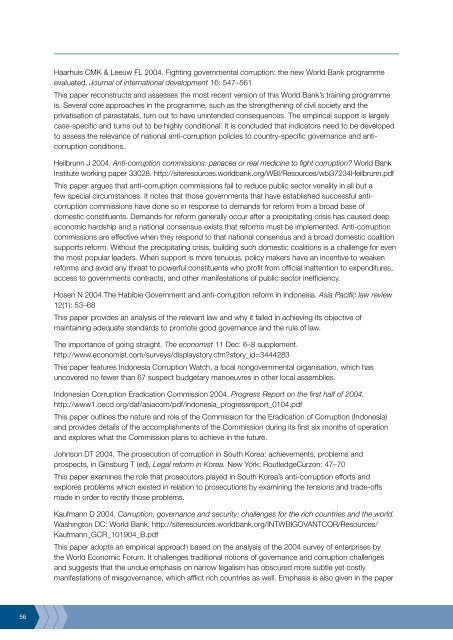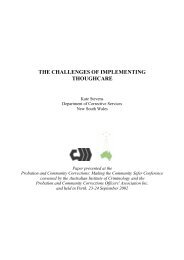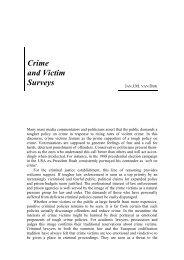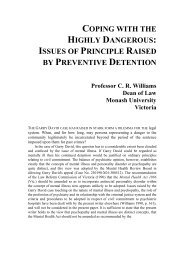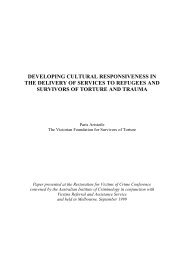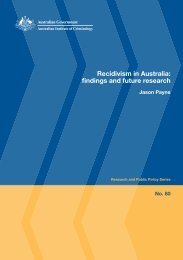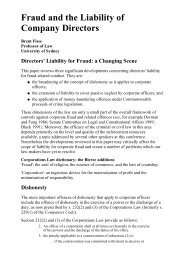Review of anti-corruption strategies Rob McCusker - Australian ...
Review of anti-corruption strategies Rob McCusker - Australian ...
Review of anti-corruption strategies Rob McCusker - Australian ...
You also want an ePaper? Increase the reach of your titles
YUMPU automatically turns print PDFs into web optimized ePapers that Google loves.
Haarhuis CMK & Leeuw FL 2004. Fighting governmental <strong>corruption</strong>: the new World Bank programme<br />
evaluated. Journal <strong>of</strong> international development 16: 547–561<br />
This paper reconstructs and assesses the most recent version <strong>of</strong> this World Bank’s training programme<br />
is. Several core approaches in the programme, such as the strengthening <strong>of</strong> civil society and the<br />
privatisation <strong>of</strong> parastatals, turn out to have unintended consequences. The empirical support is largely<br />
case-specific and turns out to be highly conditional. It is concluded that indicators need to be developed<br />
to assess the relevance <strong>of</strong> national <strong>anti</strong>-<strong>corruption</strong> policies to country-specific governance and <strong>anti</strong><strong>corruption</strong><br />
conditions.<br />
Heilbrunn J 2004. Anti-<strong>corruption</strong> commissions: panacea or real medicine to fight <strong>corruption</strong>? World Bank<br />
Institute working paper 33028. http://siteresources.worldbank.org/WBI/Resources/wbi37234Heilbrunn.pdf<br />
This paper argues that <strong>anti</strong>-<strong>corruption</strong> commissions fail to reduce public sector venality in all but a<br />
few special circumstances. It notes that those governments that have established successful <strong>anti</strong><strong>corruption</strong><br />
commissions have done so in response to demands for reform from a broad base <strong>of</strong><br />
domestic constituents. Demands for reform generally occur after a precipitating crisis has caused deep<br />
economic hardship and a national consensus exists that reforms must be implemented. Anti-<strong>corruption</strong><br />
commissions are effective when they respond to that national consensus and a broad domestic coalition<br />
supports reform. Without the precipitating crisis, building such domestic coalitions is a challenge for even<br />
the most popular leaders. When support is more tenuous, policy makers have an incentive to weaken<br />
reforms and avoid any threat to powerful constituents who pr<strong>of</strong>it from <strong>of</strong>ficial inattention to expenditures,<br />
access to governments contracts, and other manifestations <strong>of</strong> public sector inefficiency.<br />
Hosen N 2004.The Habibie Government and <strong>anti</strong>-<strong>corruption</strong> reform in Indonesia. Asia Pacific law review<br />
12(1): 53–68<br />
This paper provides an analysis <strong>of</strong> the relevant law and why it failed in achieving its objective <strong>of</strong><br />
maintaining adequate standards to promote good governance and the rule <strong>of</strong> law.<br />
The importance <strong>of</strong> going straight. The economist 11 Dec: 6–8 supplement.<br />
http://www.economist.com/surveys/displaystory.cfm?story_id=3444283<br />
This paper features Indonesia Corruption Watch, a local nongovernmental organisation, which has<br />
uncovered no fewer than 67 suspect budgetary manoeuvres in other local assemblies.<br />
Indonesian Corruption Eradication Commission 2004. Progress Report on the first half <strong>of</strong> 2004.<br />
http://www1.oecd.org/daf/asiacom/pdf/indonesia_progressreport_0104.pdf<br />
This paper outlines the nature and role <strong>of</strong> the Commission for the Eradication <strong>of</strong> Corruption (Indonesia)<br />
and provides details <strong>of</strong> the accomplishments <strong>of</strong> the Commission during its first six months <strong>of</strong> operation<br />
and explores what the Commission plans to achieve in the future.<br />
Johnson DT 2004. The prosecution <strong>of</strong> <strong>corruption</strong> in South Korea: achievements, problems and<br />
prospects, in Ginsburg T (ed), Legal reform in Korea. New York: RoutledgeCurzon: 47–70<br />
This paper examines the role that prosecutors played in South Korea’s <strong>anti</strong>-<strong>corruption</strong> efforts and<br />
explores problems which existed in relation to prosecutions by examining the tensions and trade-<strong>of</strong>fs<br />
made in order to rectify those problems.<br />
Kaufmann D 2004. Corruption, governance and security: challenges for the rich countries and the world.<br />
Washington DC: World Bank. http://siteresources.worldbank.org/INTWBIGOVANTCOR/Resources/<br />
Kaufmann_GCR_101904_B.pdf<br />
This paper adopts an empirical approach based on the analysis <strong>of</strong> the 2004 survey <strong>of</strong> enterprises by<br />
the World Economic Forum. It challenges traditional notions <strong>of</strong> governance and <strong>corruption</strong> challenges<br />
and suggests that the undue emphasis on narrow legalism has obscured more subtle yet costly<br />
manifestations <strong>of</strong> misgovernance, which afflict rich countries as well. Emphasis is also given in the paper


